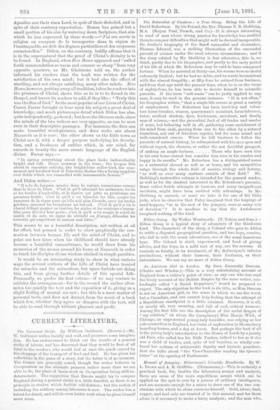The Naturalist of Curotbrae I a True Story. Being the
Life of David Robertson. By his Friend, the Rev. Thomas N. R. Stabbing, MA. (ICegan Paul, Trench, and Co.)—It is always interesting to read of men whose strong passion for knowledge has enabled them to conquer difficulties that might well be deemed insuperable. Dr. Smiles's biography of the Banff naturalist and shoemaker, Thomas Edward, was a striking illustration of the successful pursuit of science under the most adverse circumstances ; and if the story related by Mr. Stabbing is less attractive, this is, we think, partly due to his biographer, and partly to the early period of his life at which. Mr. Robertson may be said to have conquered fortune. When he married at thirty-one, his moans were no doubt extremely limited ; but he had no debts, and no wants inconsistent with the utmost frugality ; at fifty-four he retired from business, and from that age until the present time, when he is on the verge of eighty-four, he has able to devote himself to scientific pursuits. If the term " self-made " can be justly applied to any man, it may be used in the present instance. "It is not often," his biographer writes, "that a single life covers so great a variety of employment. For Robertson has been herd-boy and volun- teer horse-breaker, weaver, quarryman's assistant, farm-labourer, tutor, medical student, dyer, tradesman, merchant, and finally man of science,—not the Proverbial Jack of all trades and master of none, but behaving well in all, gathering some enrichment of his mind from each, passing from one to the other by a natural transition, not out of frivolous caprice, but for some sound and well-considered reason. When he left business to follow the pursuits of natural history, he relinquished with his oyes open and without regret, the chances, or rather the not doubtful prospect,
of making an ample fortune Those who have seen him in his own home cannot but consider him wise in his resolve and happy in its results." Mr. Robertson has a distinguished name as a naturalist abroad as well as at home, and his sympathies range through the whole field of marine zoology and botany, "as well as over many matters outside of that field." Mr. Stebbing's instructive volume is intended for the general reader, as well as for the student interested in Mr. Robertson's pursuits. Some rather feeble attempts at humour, and many insignificant incidents, might have been omitted with advantage. Is Mr. Stebbing in earnest, or must we take it for one of his little jests, when ho observes that Paley imagined that the loapings of sand-hoppers, "as in the sect of the jumpers, were so many acts' of devotion" ? It is needless to say that the Archdeacon imagined nothing of the kind.


































 Previous page
Previous page